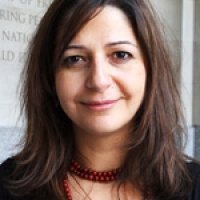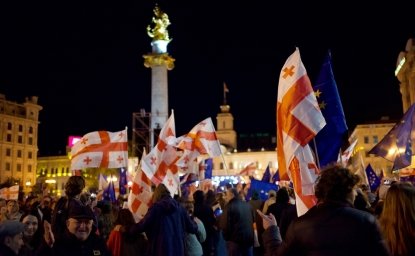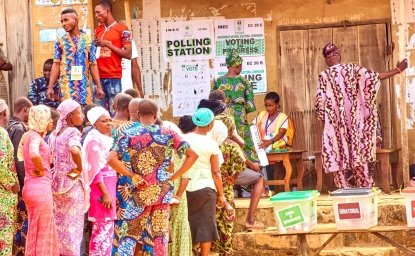Why is Qatar intervening in the Middle East today? How have its goals and strategy changed over the past decade?
Qatar has seized the opportunity of the Arab uprisings to expand its influence across the region. It moved into the vacuum after the revolutions caught the United States and other major powers by surprise. Despite its small size, it now aspires to a play a leading role in Arab politics. Doha is now reportedly funding Islamist parties. Qatar may also garner influence by investing in post-revolutionary countries where Islamists have succeeded in politics. It has promised at least $1.5 billion in loans to Tunisia and $5 billion in loans and grants to Egypt.
 Before the Arab uprisings, Qatar’s regional strategy was similar to Turkey’s “zero problem” foreign policy to act as mediator in the region. Emir Sheikh Hamad bin Khalifa al Thani had spent the previous decade building Qatar’s reputation for neutrality, using soft power to gain influence. It gave generous loans and aid packages to struggling countries. Qatar used Al Jazeera, the first major Arab satellite television channel, as its primary tool to promote its regional agenda.
Before the Arab uprisings, Qatar’s regional strategy was similar to Turkey’s “zero problem” foreign policy to act as mediator in the region. Emir Sheikh Hamad bin Khalifa al Thani had spent the previous decade building Qatar’s reputation for neutrality, using soft power to gain influence. It gave generous loans and aid packages to struggling countries. Qatar used Al Jazeera, the first major Arab satellite television channel, as its primary tool to promote its regional agenda.
Doha stopped playing the role of a neutral mediator two years ago. In March 2011, it switched gears and called for intervention to help the Libyan rebels. Qatar is now taking sides.
But its current support for Islamist groups is based on pragmatism, not ideology. Doha is basically betting on Islamist parties dominating the future of Arab politics. Islamist parties have already won electoral pluralities in Egypt, Morocco and Tunisia.
Courtesy of its vast natural gas reserves, Qatar may even have enough resources to influence politics beyond the Middle East. (In 2011, it had the world’s highest Gross Domestic Product per capita at $92,501.) The sheikhdom now assumes that world powers will have to deal with Doha to build relationships with new Arab governments.
What groups is Qatar backing in the region? What type of support is it providing, and what impact is it having?
Qatar is primarily supporting branches of the Muslim Brotherhood in Egypt, Gaza, Libya, Syria and Tunisia. It may be backing Islamists in Mali. Qatari-owned Al Jazeera now favorably covers Islamists parties across the region. The media attention has helped build their profiles compared to their secular competition.
The Libyan uprising prompted the dramatic change in Doha’s foreign policy. In March 2011, Qatar became the first Arab country to recognize the National Transitional Council (NTC) as the legitimate representative of the Libyan people. It even contributed six fighter jets and pilots to combat Colonel Moammar Qaddafi’s forces. Qatari advisers reportedly provided the ragtag rebels with arms, supplies, training and up to $10 billion. Doha also marketed oil for the fledgling Libyan government. And it helped launch a pro-revolution satellite channel to counter Qaddafi’s propaganda.
But some Libyans suspect Qatar has ulterior motives. Many have claimed Doha provided Islamists with the bulk of arms and money. Qatar basically supported the Muslim Brotherhood, former NTC Deputy Prime Minster Ali Tarhouni said in a January 2012 interview with TIME.
In Egypt, Qatar is reportedly supporting the political arm of the Muslim Brotherhood. In September 2012, Qatar pledged to invest $18 billion in Egypt—less than two months after President Mohamed Morsi, a former Brotherhood official, was elected.
Qatar has reportedly provided funds to the Tunisian Ennahda Party, the Islamist movement that leads the coalition government, although leader Sheikh Rachid Ghannouchi and other Ennahda officials have denied receiving foreign funds.
Doha is also courting the friendship of Hamas, the Palestinian Islamist movement ruling in the Gaza Strip. In a direct challenge to Israel, which has blockaded the territory since 2007, Qatari Emir Hamad bin Khalifa al Thani made the first state visit to Gaza in October 2012. He pledged $400 million to rebuild homes and infrastructure in the isolated territory. Hamas leader Khaled Mashal, who spent a decade based in Syria, relocated to Doha in February 2012.
In January, two French politicians accused Qatar of providing material support to separatists and Islamists in northern Mali. The claim has fueled speculation that the emirate is playing a behind-the-scenes role in spreading Islamic fundamentalism in Africa.
What is Qatar doing in Syria and what are its specific objectives there?
Qatar’s new interventionist policy is most evident in Syria, where it reportedly is giving the rebels money, equipment, and weaponry. Al Jazeera, Qatar’s media arm, has aired extensive coverage of Islamist brigades fighting Syrian government forces; it also airs long interviews with Islamist rebel leaders.
But Doha may be overestimating the power and popularity of Syria’s Islamists. Many rebels reportedly pretend to be Islamists to receive weapons and money from Qatar’s intermediaries. The fighters adapt their rhetoric and appearances to appeal to those distributing weapons by growing long beards, chanting religious songs at demonstrations, or giving religious names to their brigades.
Qatar has mediated several conflicts over the last seven years. What does it get out of mediation?
Qatar attempted to mediate the Hamas-Fatah conflict (2006), the Houthi insurgency in Yemen (2007), the Lebanese political crisis (2008), the Darfur conflict (2008) and the Eritrea-Djibouti border dispute (2010). This soft power strategy yielded mixed results.
But Doha was able to forge ties with disparate groups and countries. Qatar even had trade relations with Israel from 1996 to 2009. A key U.S. ally in the Gulf, Qatar also had friendly relations with Iran. The two share the world’s biggest gas field. But relations with Tehran have soured due to Qatar’s extensive support for the Syrian rebels.
After the Arab uprisings began, Doha obviously decided to play a more active role in the region. But Qatar has taken a risk by betting on the continued success of Islamist parties. And its vision for the region may conflict with U.S. interests. If the Brotherhood and other groups do not dominate new political systems, Qatar may not attain the kind of influence and leadership it seeks in the Arab world.
Hanin Ghaddar is the managing editor of NOW Lebanon and was a public policy scholar at the Woodrow Wilson Center for International Scholars Middle East Program in 2012.
Photo credit:Sheikh Hamad bin Khalifa al Thani by Kremlin.ru [CC-BY-3.0 (http://creativecommons.org/licenses/by/3.0)], via Wikimedia Commons





